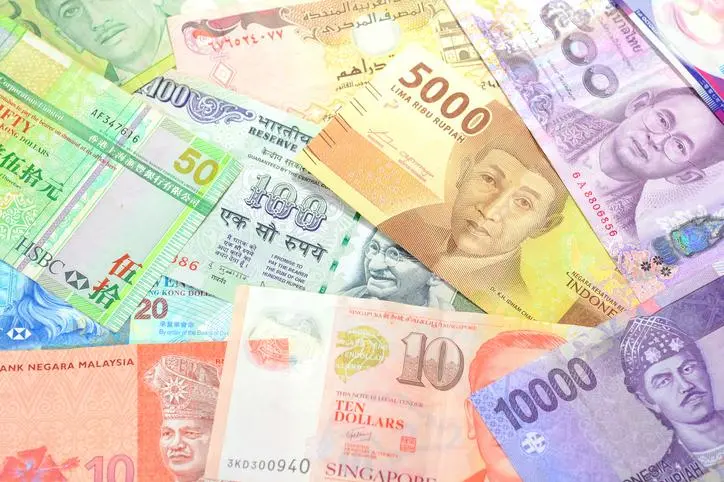PHOTO
(Reuters) - Malaysia's ringgit and Taiwan's dollar gained the most among emerging Asian currencies on Monday as U.S. fiscal concerns and sudden shifts in U.S. President Donald Trump's trade policies pushed the dollar index to a one-month low. The MSCI index of emerging market currencies rose as much as 0.4% to an all-time high. The Malaysian ringgit and the Taiwanese dollar jumped 0.6% and 0.5%, respectively, to three-week highs, while the Singapore dollar reached an eight-month peak. The Taiwan dollar is the best regional performer so far this month, with an over 6% gain. Two days after threatening to slap 50% tariffs on imports from the European Union next month, Trump, on Sunday, restored a July 9 deadline for talks. While that calmed worries about a global downturn, it also served as a reminder of how quickly and suddenly U.S. trade policy can turn. Trump's policy reversals, as well as his sweeping spending and tax-cut bill currently in legislation, turned investors off from U.S. assets, with the dollar the prime target. The dollar index, which measures the greenback against a basket of currencies, touched its lowest since April 22.
"The dollar selling seems to be fairly broad-based, and clearly a lot of EM Asian currencies are reacting to that," said Mitul Kotecha, head of Asia FX and emerging markets macro strategy at Barclays. China's yuan strengthened to trade near a seven-month high, while the South Korean won climbed as much as 0.4% to its highest since October 2024. The won has gained over 4% so far this month and is the second-best regional performer, amid broader dollar weakness and chatter that the country could use exchange rate revaluation as a carrot in trade talks with the United States. "The KRW is facing appreciation pressure amid ongoing Korea–U.S. trade negotiations, which have raised expectations for a realignment of the undervalued currency," DBS analysts said. The stronger won and weakening macroeconomic indicators add to the rationale for a rate cut by the Bank of Korea on Thursday, they added. In Thailand, the baht weakened 0.5% and equities slipped 0.6%.
Data showed that the country's export growth in April was slower than the previous month, while the commerce ministry warned exports in the second half will face a risk of U.S. tariffs after a moratorium expires in July. Among stock markets, Seoul shares jumped 2% to a three-month high, while equities in Jakarta, Singapore and Kuala Lumpur slipped between 0.2% and 0.9%. HIGHLIGHTS: ** Malaysia PM has written to President Trump to organise U.S.-ASEAN meeting ** Thai growth may be just over 1% in 2025 due to tariffs , minister says ** India's central bank seeks approval for overseas rupee lending to neighbours, sources say Asia stock indexes and currencies at 0727 GMT Japan -0.18 +10.08 1.00 -5.92 China India +0.19 +0.66 0.52 5.66 Indonesi -0.12 -0.89 -0.87 1.01 a Malaysia +0.52 +6.23 -0.34 -6.83 Philippi -0.05 +4.87 -0.36 -2.13 nes S.Korea Singapor +0.05 +6.40 -0.17 2.33 e Taiwan +0.38 +9.60 -0.53 -6.51 Thailand -0.51 +5.13 -0.44 -16.36
Reuters





















